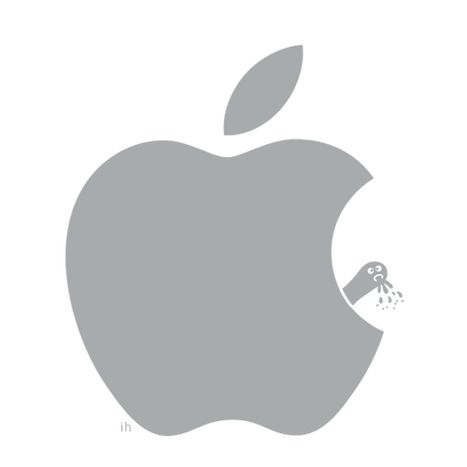
Environment: the maggot in Steve Jobs’ apple
Published on
Translation by:
 ZoeBBee
ZoeBBee
While tributes to its CEO Steve Jobs flood the web, don't forget Apple’s lack of green credentials
Praised, magnified and glorified… As he looks down from wherever he is now, Steve Jobs will no doubt be thankful for the outpouring of adulation in the wake of his death: ‘Brave enough to think differently, bold enough to believe he could change the world, and talented enough to do it,’ remarked US president Barack Obama. ‘One of the great visionaries of the century,’ according to French head of state Nicolas Sarkozy. ‘People like Steve Jobs change our world, said Dimitri Medvedev, the technology-savvy Russian president (he certainly changed Medvedev’s world: during the president’s 2010 trip to Silicon valley, Steve Jobs presented him with a since much-used iphone). From US film director Spike Lee to the actress Eva Longoria, dozens of well-known figures have paid tribute to the Apple founder. A man of vision, daring and intelligence: without doubt, Steve Jobs was all these things. However, the phenomenal media reaction to his death must also provide an opportunity for us to look at the reality of the Apple brand, and the impact of its products on our everyday lives and the environment.
Read 'Twitter feed: reactions to Steve Jobs' death' on cafebabel.com
Over the space of a decade, Apple technology has taken over the world. In the midst of a global financial crisis, Steve Jobs’ company is posting impertinent results, with a turnover that just keeps on growing, and profits of billions of dollars. However, Apple’s environmental record is appalling. Its telephones and computers are assembled on production lines in Chinese factories which in turn work with subcontractors. According to environmental groups, Apple is therefore responsible for large-scale pollution, and is complicit in the deplorable working conditions that prevail in these factories, where working practices are obscure. Numerous reports point to massive soil, water and air pollution in several regions of China, which has a grave impact on workers in the factories. The deplorable working conditions on the factory floor also give rise to fatal accidents and numerous suicides. Whilst Apple is not alone in using these suppliers, it bears a double burden of responsibility: there is a direct link between the extremely low costs that it demands of suppliers and the social and environmental conditions. Moreover, the business is one of the least transparent when it comes to communication around such matters. This is exacerbated by its willingness to promote its image as an environmentally and socially responsible brand. The news of the Apple founder’s death on 6 October, intensified by media organisations who themselves are influenced by the internet and the technologies that they use, must not prevent us from critically examining the impact of these magical products not just on our lives but on the world around us.
Image: (cc) i.hoffman/ Flickr
Translated from Steve Jobs, Apple et l’écologie : le ver est dans la pomme


